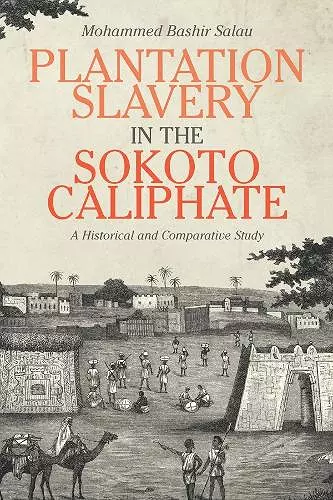Plantation Slavery in the Sokoto Caliphate
A Historical and Comparative Study
Format:Hardback
Publisher:Boydell & Brewer Ltd
Published:15th Nov '18
Currently unavailable, and unfortunately no date known when it will be back

A work of synthesis on plantation slavery in nineteenth century Sokoto caliphate, engaging with major debates on internal African slavery, on the meaning of the term "plantation," and on comparative slavery A large-scale study of plantation slavery in West Africa with a focus on the nineteenth-century Sokoto caliphate, this book draws on diverse sources including oral testimony, Arabic material, and extant scholarly works about the caliphal state. Plantation Slavery in the Sokoto Caliphate: A Historical and Comparative Study offers new views on various fundamental issues including the definition of blackness in the Sokoto caliphate, the meaning of theterm "plantation," the significance of plantation slavery in the caliphal state, and the role of slavery in the context of African states. Author Mohammed Bashir Salau analyzes key themes in the history of plantation slavery, especially plantation management and the acquisition, treatment, and control of slaves. Building on this analysis, Salau points to previously unknown ways in which the caliphal state prevented the development of serfdom, arguing that while social and economic factors played a role in the rise of slavery in the Sokoto caliphate, conscious political choice was the major factor for the rise and maintenance of plantation slavery. This study will be of major interest to students and scholars of slavery in Africa in general and in the Sokoto Caliphate in particular; in addition, through its comparative discussion it contributes to the literature on second slavery. Mohammed Bashir Salau is an Associate Professor of History at the University of Mississippi.
Plantation Slavery in the Sokoto Caliphate is well argued and grounded in written records and oral evidence. [T]he book offers a valuable historiographical contribution to the study of plantation slavery, precolonial African states, Islam, and West African history. * CANADIAN JOURNAL OF AFRICAN STUDIES / REVUE CANADIENNE DES ÉTUDES AFRICAINES *
[T]he book is a most valuable contribution to the literature on the economic history of slavery. * ECONOMIC HISTORY REVIEW *
This is a comparative study and a quality addition to the historiography of slavery and its abolition in West Africa. .historians and researchers especially those with keen interest in slavery-related studies will find it very informative and inspiring. * AFRICAN STUDIES QUARTERLY *
Salau's is an excellent book - well written, carefully researched, and incisively argued. It should be widely read by historians of African and of comparative slavery. * American Historical Review *
Plantation Slavery in the Sokoto Caliphate: A Historical and Comparative Study presents a refreshingly new argument that privileges the role of political power, slaves' agency, and aristocratic politics over economic and social logics in birthing, sustaining, and destabilizing slave systems. This paradigm is especially compelling for polities such as the Sokoto caliphate, where the practice of slavery was integral to political transactions and to the process by which aristocrats earned and maintained status. Mohammed Bashir Salau's work blazes a new trail for the field. -- -- Moses Ochonu, Vanderbilt University
ISBN: 9781580469388
Dimensions: unknown
Weight: 532g
246 pages